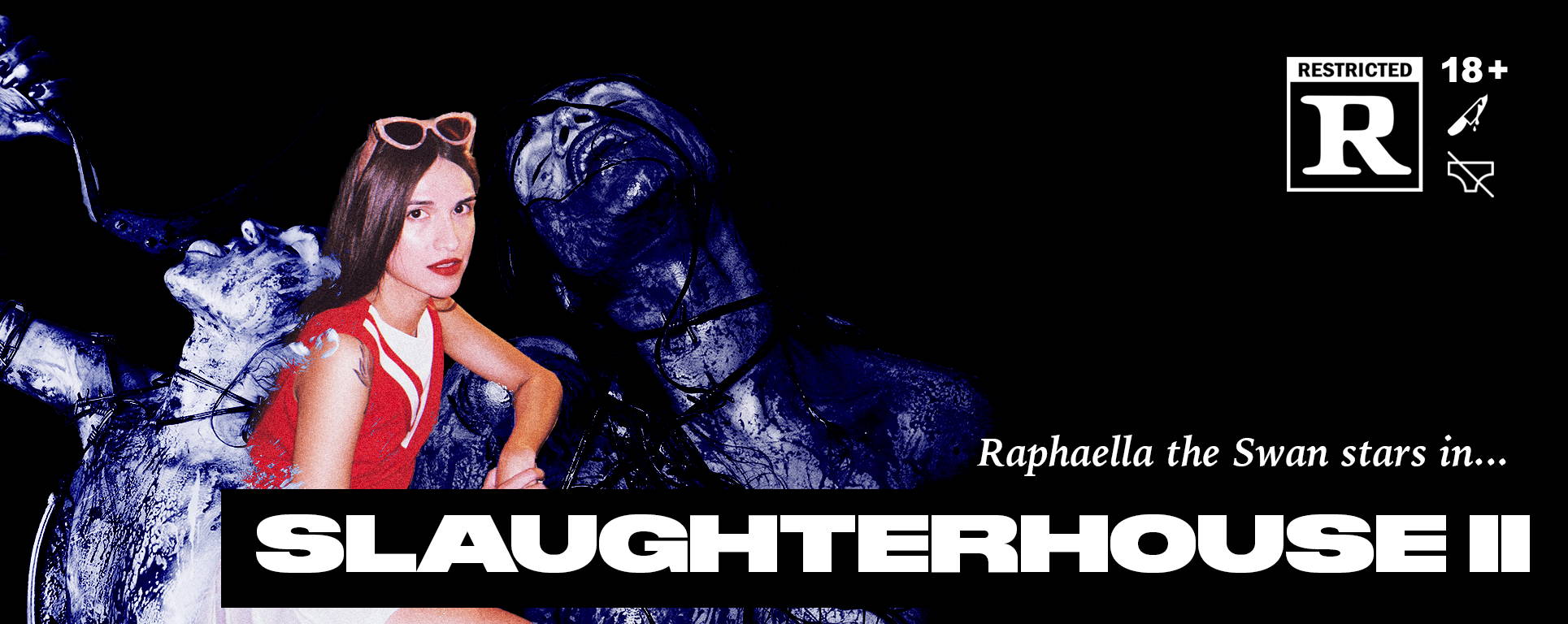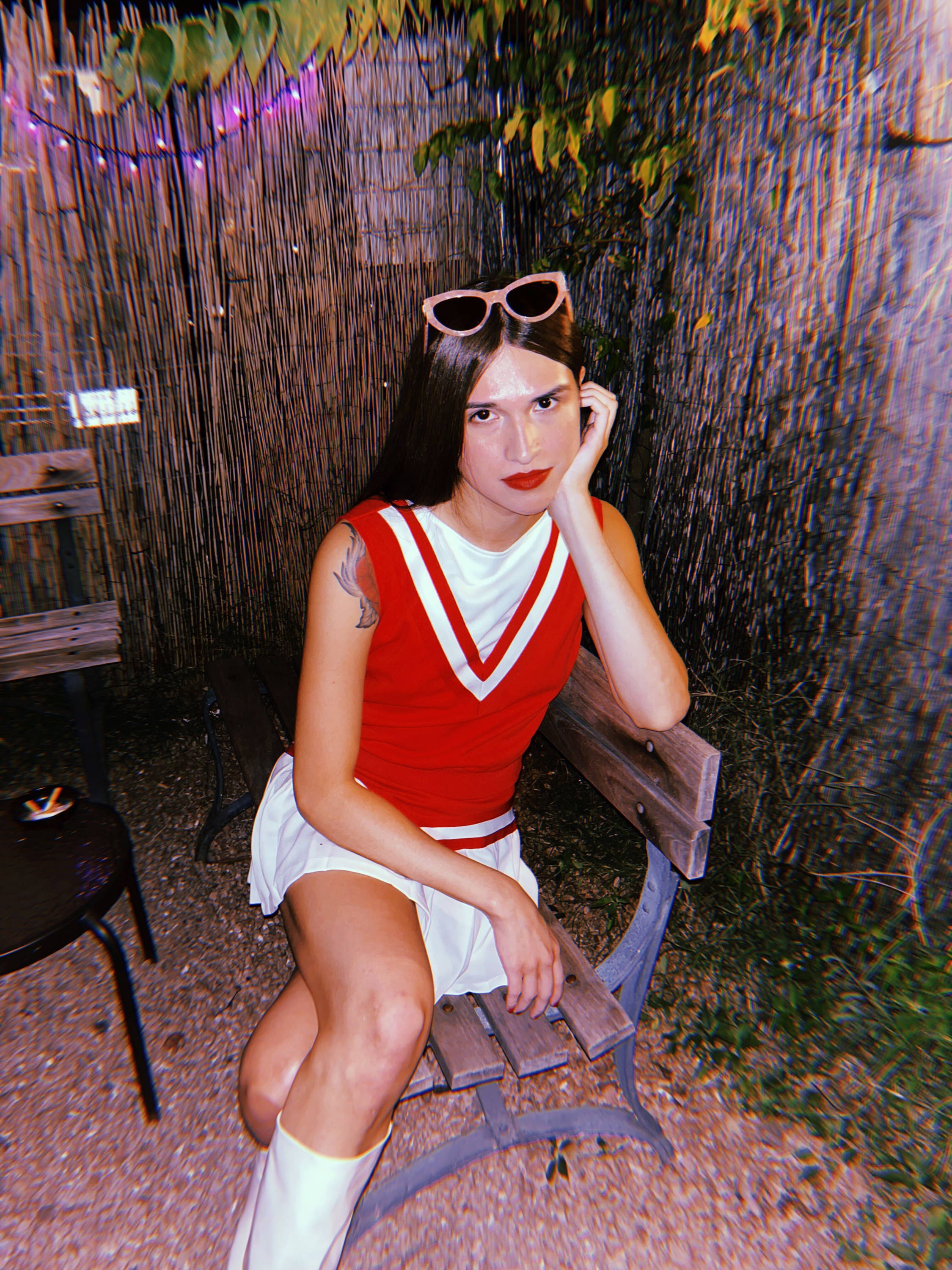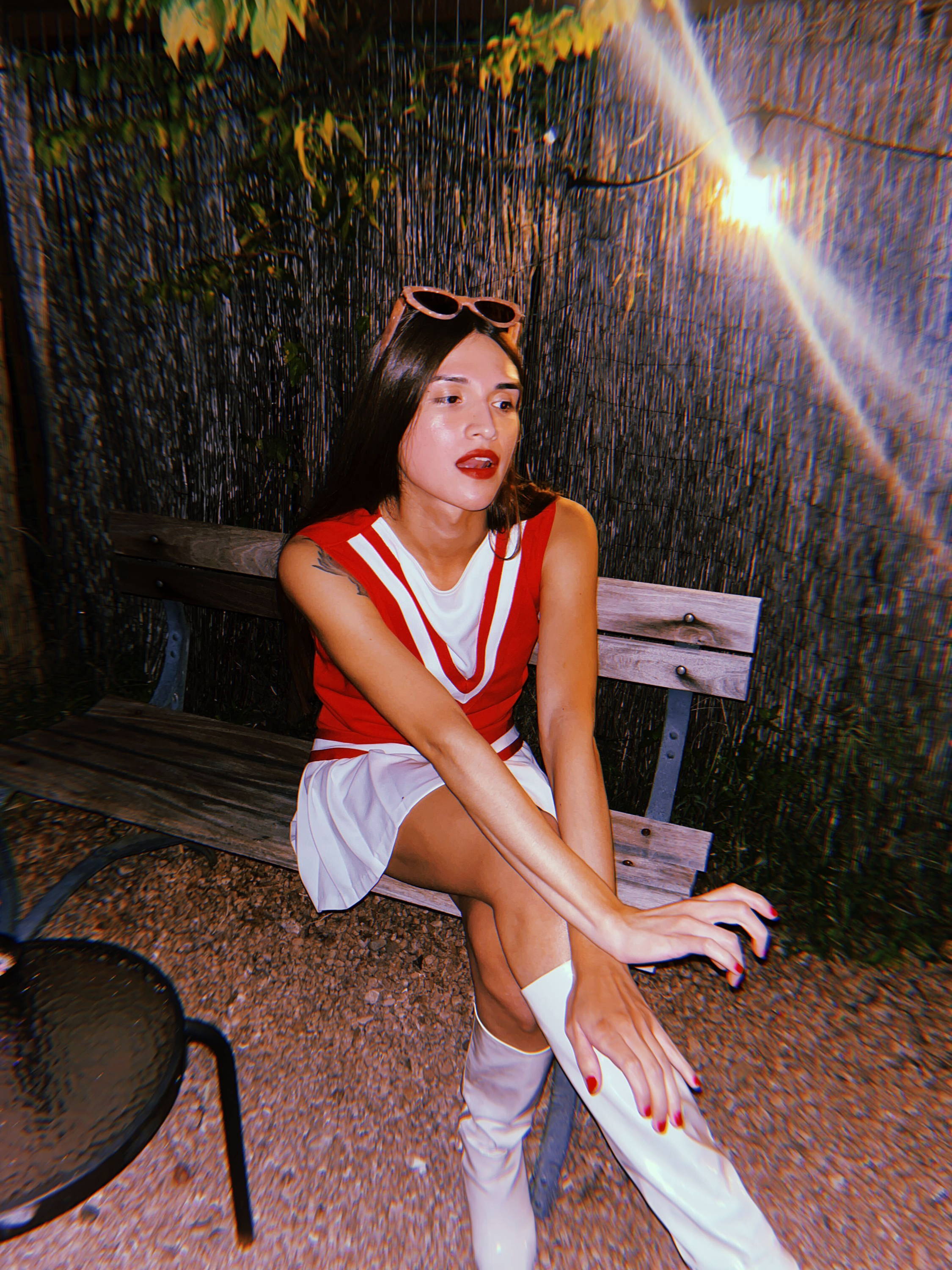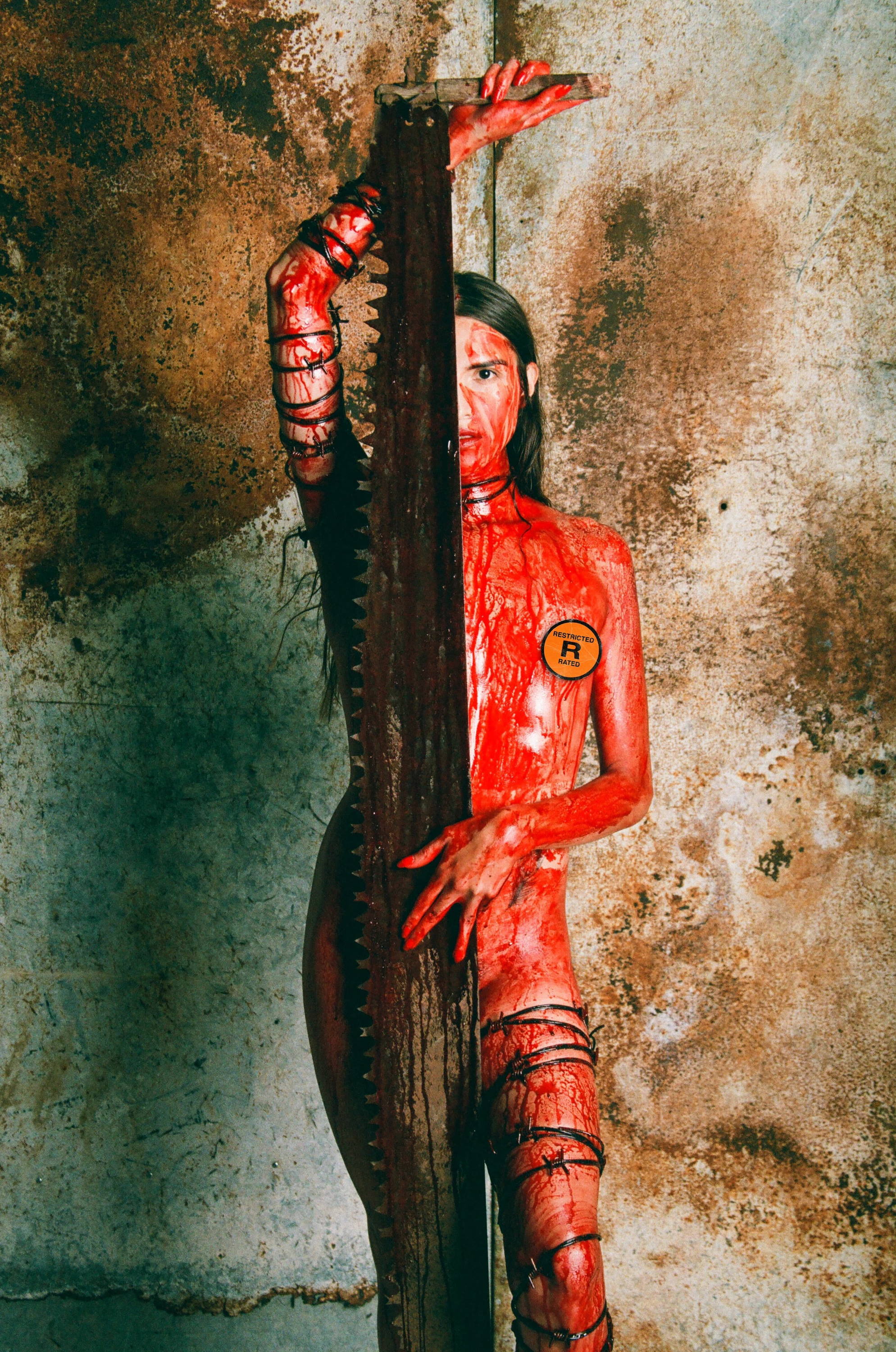FREE SHIPPING ON ALL U.S. ORDERS OVER $100

By E.S. Sparks
Confession time: Over the course of my life, I’ve been told my communication style can at times be… challenging. It seems some people would appreciate a little warm-up in the beginning of a conversation before being nudged into the dense, dark deep end. So, to break that ice, one might start off with something innocuous.
As I sit nearly knee to knee with the striking local performance poet, Raphaella the Swan, in the twinkling backyard of The Tigress Pub, I compliment her blood-red cheerleader’s uniform, immaculately tailored to her corporeal form. Her old copy of Dante's Inferno next to my smokes, it seems the theme runs deep—the kind of headspace required for the upcoming live performance of her body of poetry, SLAUGHTERHOUSE II.
She thanks me and immediately launches off the diving pad: “I love the myth of archetypes. I’ve always loved the archetype of the cheerleader. I wrote a cheerleader script in high school, it was my version of a cheerleader movie. I’m still working on it. I got really inspired to buy a cheerleader uniform. This one belonged to a girl named Emily.”
“Is the name sewn in?” I ask.
“Yup her name’s sewn in the sweater,” she says before deadpanning, “Everyone’s like, ‘Where’s Emily?’ I’m like, ‘I ate her.’”
Neither one of us breaks character. While dark humor may not be for everyone, it most definitely is something I relish, particularly as a means of shaping an absurd and often hostile world into something a little more manageable. In this instant, one might feel compelled to attempt an uncomfortable chuckle, or brush past it. Not I, dear reader, not I.
“Honestly if I was a cheerleader in high school,” Raphaella continues, “I would’ve been such a mean girl. The power would’ve went to my head.”
“Uh, I think you probably still had power,” I mutter without thinking. She laughs. Ice shatters.
Because there is power in staring, unflinchingly, into the dark. And if you’re lucky you might find someone staring right back at you, armed with a scythe, to cut through the chaff and usher you into their world. It is beautiful, and not for the faint of heart. But I’ll stop gushing, apply some tender pressure to stop my bleating, and introduce you to my new favorite poet: Raphaella the Swan.
Welcome to the SLAUGHTERHOUSE.

Did you want to be a cheerleader in high school?
No, I didn't want to be anything in high school other than a writer. I was always kind of a loner and I always stuck to myself. I never had many friends, I would just stay at home and watch a lot of horror films and write horror films. I would’ve been a bad cheerleader—I’m a team player, but I’m not into feeling like I’m in a cult. That’s why I’ve never joined any organization or anything because often people tend to make a cult out of it and I just don’t like that. So I’ve always been very individualistic. When it comes to queer community, yeah for sure, because that is beyond the superficial identity. [And] I am part of a literary group, [The] Poetry Brothel and Red Light Lit. so I’m just glad that it was within writing, you know, not anything else. I’m really grateful that I found a writing community.
Where are you from?
I was born into a migrant family, so I’m from everywhere. But I was born in Uvalde, Texas, around an hour forty-five [minutes] southwest of San Antonio. Uvalde is pretty much known for oak trees, honey, and Matthew McConaughey. And now, unfortunately [the mass shooting at] Robb Elementary. And then I lived in the panhandle of Texas, I lived in the Valley, specifically McAllen, and I also lived in New Mexico, Colorado, and Oklahoma. I lived everywhere on and off in my childhood, it wasn’t a yearly period, more like monthly.
I’m very much a Texan, I can feel it within me mostly because my family has been in Texas for generations. Like I said we were born into a migrant family, but I’m very assimilated. I’m assimilated as fuck. I grew up not traditionally Mexican, but more traditionally Tex Mex. There’s a difference to that, so I identify as Tejana.
My first language was Spanish, then I developed a really bad stutter learning English so I had to go to speech therapy and so my parents pretty much decided, It’s best for her to learn English, it’ll get her farther. No one in my elementary school spoke Spanish, and there were a lot of Mexican kids, but not a word of Spanish was said. It’s weird, a lot of Tejanos tend to have this motivation to adopt white culture, which doesn’t make sense. There’s a lot of prejudice. A lot of local Uvaldians thought we were drug dealers, my family being contractors—I was more privileged than other migrant children because my family were contractors. However, I grew up with one foot in privilege and one foot in oppression. My parents had me very young at 17 years old, and they separated when I was three, and my mom totally broke away from my dad’s family because she wanted to do it all on her own, she didn’t want help. When I stayed with my dad I had everything I wanted, and when I stayed with my mom our lights would get shut off because she couldn’t afford to pay the light bill. It’s really weird growing up on the railroad tracks, not on either side. It’s very funny how you’re treated when you’re Mexican and people only view you as a drug dealer, that’s how you have this money, that’s how you can make a name for yourself, which is not true. Mexican families work hard and have their own businesses, but a lot of the Texan culture just doesn’t want to acknowledge that people of color can be successful. And in a sense, Texans are so proud of being Texan, yet they betray each other.
Can you speak more to that betrayal? I’ve never thought of it that way.
Considering the types of laws that are passed here, and the types of dangers that people of color who live along the border have to face. Not only that, but queer people, Texan women, and the trans community… When I see people who are opposed to certain laws that will allow people of color to get out of this cycle of suffering enjoy Mexican food, Mexican festivities and the celebration of Mexican culture without supporting the people who brought it here and created it here.
Cowboy culture, for instance. Mestizos and Black Vaqueros were a thing before white people adopted it. I did a whole deep dive on Western cinema, and how people idealize John Wayne. When you really dig deep into that, Western cinema totally erases the Asian community as well, because there were a lot of Chinese immigrants that were here that built a lot of what we use today. And when you watch a lot of Western cinema, they’re just [reduced to being] bodies in the background and even then they don’t get many parts. It just feels like people are proud to be Texan as long as it’s the assimilated white version. So it feels like a betrayal because Texas is so rich in culture [but] people don’t want to be accountable for the things that they celebrate and the stuff they partake in, and they’re so actively trying to restrict a lot of our autonomy.

Of course it’s not your responsibility to educate—
Exactly. It’s crazy because you feel like you need to uphold a representation when that’s not the case at all. You’re just a person, everyone is flawed. I don’t think anyone should be held on a pedestal, with the exception of our politicians, because they are the ones that create suffering. But as far as artists are concerned, people really put them on a pedestal and they need to be this pure, perfect being. That’s just not true. We can only do the best that we can. I can only do the best that I can, considering that I’m a migrant and Tejana and trans. I should not be put on a pedestal.
Unfortunately it does often fall on the more thoughtful, articulate artist types to lead the conversation along with everything else you have to face, because we can’t look to politicians or people in power. What would you like to see in terms of celebrating versus co-opting or stealing culture? How can we find a way to make it healthy for everyone and celebrate a culture without feeling like something has been taken away or appropriated?
You know, I always think about that. To quote Kate Bush—and I always say this quote—it’s about “exchanging the experience.” It’s not about taking an experience and casting it as your own. It’s just about being welcomed in a space and celebrating in that space, and then leaving with a sense of empathy and understanding. Find the authentic voice, and give it dignity and integrity. That’s what I try to look for within the things I consume.
One of the core things I struggle with—and I think all writers and artists struggle with this—is context. How important is context? How much do I matter and how much does the work actually just need to be its own thing?
You know that is so difficult because you can’t control a narrative. You really can’t control how people perceive your poetry or your story. They take away something that is relatable to them. Something that is “the Other” I feel like people really try to understand that. For example, Get Out directed by Jordan Peele, I feel like that was a big cultural movement into that direction. People paid to go into a theater and experience the Black experience and walk out with a sense of understanding that there are things like microaggressions and soft violence. They exist. Context I think is up to the audience if they want to go in trying to understand. Because you can have someone go into something and just try to judge it throughout the whole film, or try to outsmart the book, and there’s a sense of blockage there. If that’s the case—if you’re going into something with a blockage—you’re not going to grow. and music and film help us grow. Typically artists do it to understand themselves, and then release it to the world as a sense of catharsis. But once an artist releases something it’s not theirs anymore. Context is really up to the audience because if people research the artist they can understand that context. Only if they take that extra step to understand who made it, and not a lot of people do that, they just take the product. So it’s really up to the audience to allow themselves to be opened up, and really it’s up to them to hold the scalpel and slit themselves open. Not a lot of people want to do that.

To prepare for this conversation, I so wanted to read your poetry. I scoured your socials but couldn't find any!
I'm very protective over my writing. I don’t have my poetry on my Instagram. I want people to experience the poetry when they experience it from me. I’d rather just post a very cohesive mood and identity of who I am not only as a poet but as a trans woman. As of now my poetry is only heard during performance. Performance poetry is not really meant to be printed, it’s meant to be heard.
My writing journey has been really interesting. I started drawing storyboards when I was in fourth grade out of white lined paper. I kept them in a binder. They were basically badly drawn comics. Well, I did seven of them from fourth grade to ninth grade, and they were all creature features. Then in high school I started writing slashers. In college I started writing more complex and nuanced stuff. I’m 28 now, these novels I’ve saved have been growing and growing. I do plan to write them and release them but poetry is where I’m at right now.
Whatever I am, whatever people perceive me as, whatever people consume—it’s just a byproduct of my writing. Whether it be my fashion sense, my image, my performance—it’s all a byproduct of my writing. I’m a writer first, above all things.
What do you think is so effective about the horror genre?
I started eating horror up since I could remember. My first horror film was Pumpkinhead released in 1988 directed by Stan Winston. In Uvalde there’s this video rental store—called “Video Store.” We would go there every weekend and I’d always go to the horror section. Just to look at the VHS art. I remember my mom one day said, “Okay you can pick anything you want.” And I finally had the courage to pick a horror film, and it was Pumpkinhead. Because of the artwork with the claws holding the pumpkin. It made my imagination just spark—there were fireworks in my head. When you look at a movie poster or a VHS cover, you haven't experienced the film yet so your imagination is going crazy [over] what this thing is going to be. And I was really really young, [Pumpkinhead] ended up scaring the shit out of me. But we rented it so much that my mom ended up buying it from the store. Ever since then I have been just in awe of the horror genre—it transcends all other genres, I think. Like if you look at the genre tree of horror there’s so many subgenres, more than any other genre. It’s insane that something that is so taboo and controversial and ostracized can do that and that’s always intrigued me. Because horror challenges power. And that’s what I love. I’ve never been someone to take shit. My grandmother and my mother always said I was a good kid, but a defiant kid, and I never did anything that I didn’t want to do. I’ve always loved the punk rock [nature of] horror and how it’s challenged so many people for decades. For me, horror just… It helps me understand myself and the things that I went through. It articulates human suffering so well. There’s just this sense of healing that comes from horror.
You have an upcoming live performance of your work, SLAUGHTERHOUSE II, at [artist-owned Austin theatre venue] The Vortex. What can you tell us about it?
It’s a total liberation [from] religion. And my upbringing. Binary upbringing, heteronormativity, everything. It just severs all.
When I moved to Austin in 2017, more of the bigger poems started coming, and when I finally performed SLAUGHTERHOUSE [for the first time] during quarantine 2020 on a three hour streaming event with The Poetry Brothel, that’s when SLAUGHTERHOUSE was birthed. I was like, Oh my gosh, I have a horror poetry collection, I should make this into something. It had all of these feminist themes, and transness themes, and sexual liberation, domination, submission, sadism, masochism, pain and pleasure. I started just subconsciously writing pieces inspired by the Inferno, and SLAUGHTERHOUSE just started from there. This coming Sunday, Oct 30th will be SLAUGHTERHOUSE II, which will be the third time I’ve performed the collection.
I haven’t always worked up to SLAUGHTERHOUSE, it just naturally happened. And I’m so thankful that I had to go through all of my experiences to get to SLAUGHTERHOUSE, because I think it’s a very palpable piece of work and I feel like a lot of people do get it and do want to experience it.
SLAUGHTERHOUSE II
Created by Raphaella the Swan
Presented by The VORTEX
October 30, 2022 ONE NIGHT ONLY
Doors open at 8:30pm
Showtime at 9:00pm
Buy tickets here
“Evil stretches for miles and miles on end.
In Texas there is no escape when the fields run red–”
This October 30th, 2022, for one night only, SLAUGHTERHOUSE II ascends from Hell with a night of cinema, poetry, and theater. SLAUGHTERHOUSE II explores the trans-feminine through the Queens and Succubi that live within the world of The Inferno where pain is perverted into pleasure and pleasure into pain.
Experience domination, submission, liberation, and damnation! All from the mind of Austin’s local performance poet, Raphaella the Swan, who originally birthed SLAUGHTERHOUSE in October 2020 during quarantine, revived it for it’s first live performance in 2021, and now brings the sequel to the historic Eloise Stage at The VORTEX.
Featuring Raphaella the Swan, with guest performers Alexis Lepore and Sarah Lynn. Music Composed by Caephra.
WARNING: SLAUGHTERHOUSE II CONTAINS NUDITY, VIOLENCE, BLOOD, GORE, SATANIC REFERENCES, STRONG SEXUAL CONTENT, DISTURBING IMAGERY, AND GRAPHIC LANGUAGE. NO ONE UNDER 18 ADMITTED.
